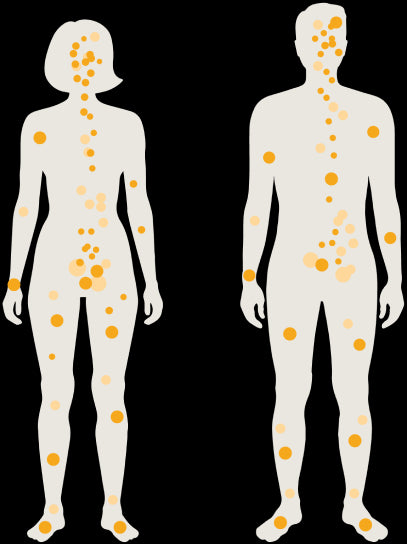The what, where and why of CBD.

CBD
CBD stands for cannabidiol. It acts as support to a complex network of receptors and neurotransmitters in our brain, nervous system, and immune system called the endocannabinoid system, or ECS. By blocking the breakdown of our own, naturally produced endocannabinoids, CBD can help us feel better in a myriad ways. CBD-based medication has been FDA approved for the treatment of epilepsy, and some early research shows that it has may have significant potential for other treatments. The FDA doesn’t allow producers – like us – to talk about the specific benefits associated with CBD.
The Endocannabinoid System
The ECS is an active part of our bodies. It is a complex system that regulates many of our biological functions, including stress, mood, cognitive performance, pain perception, and immune response. Each cannabinoid has a unique effect on the ECS. When stimulated, the ECS has been shown to relieve pain, reduce inflammation, ease stress and anxiety, and boost energy.

Cannabinoids in the body
The endocannabinoid system (ECS) is spread throughout the body and is thought to deliver endocannabinoids and cannabinoids to the areas of the body that need it most.
There are two primary types of receptors, CB1 and CB2.
- CB1: These receptors are found primarily in the brain and central nervous system.
- CB2: These receptors are found mostly in peripheral organs, particularly in cells associated with the immune system. nervous system.
Types of CBD
There are three classifications of CBD extract: full-spectrum (which contains all the cannabinoids including THC), CBD isolate (which contains only the CBD cannabinoid), and broad-spectrum. We use broad-spectrum CBD extract because it contains the entire spectrum of cannabinoids and all the other beneficial plant compounds found in the hemp plant, but without the psychoactive compound THC. Because all traces of THC are removed after extraction, broad-spectrum extracts mean receiving all the benefits without the THC “high.” Utilizing the whole plant rather than one isolated cannabinoid means experiencing the synergy of CBD, secondary cannabinoids, terpenes, and essential oils and their positive effects. Broad-spectrum CBD is also a good source of iron, protein, fatty and amino acids, and B-complex vitamins.
Hemp
Our broad-spectrum CBD is derived from the hemp plant – cannabis varieties that contain 0.3% or less of the psychoactive compound THC, by dry weight, are classified as hemp. Scientists have identified over 100 cannabinoids in hemp, with CBD and THC being the most well-known and researched.
2727 BC The first recorded use of cannabis for medical purposes
1940 Scientist Roger Adams isolates CBD from marijuana
2007 New Mexico becomes the first U.S. state to legalize cannabis as medicine
2018 US legalizes production of hemp
2021 US FDA approves first pharmaceutical use of CBD - GW Pharmaceutical's EPIDYOLEX® considered among the best treatments for epileptic seizures
There’s a lot to know about CBD. Here’s a place to start.
What is broad spectrum hemp extract?
Hemp-derived extract refers to CBD extract that has been sourced from the hemp plant rather than the marijuana plant. The term ‘hemp’ is used to classify Cannabis varieties that contain 0.3% or less of the psychoactive compound, THC, by dry weight.
Will it get me high?
No. While CBD may have a mild calming effect, it does not produce the “high” often associated with cannabis. Our products do not contain THC, the psychoactive component that causes mind-altering effects.
How do I know what’s good or bad CBD?
Not all CBD products are created equal. In fact, the lack of regulation in the CBD industry means many products on the market are not what they claim to be. Some fail to pursue any kind of lab testing, some exaggerate their potency or quality, and some actually lack any CBD at all. When trying to decide between the plethora of options, start by looking for products made with full- or broad-spectrum CBD and by companies who test their products through third-party labs and make those results readily available (like we do).
What does “broad spectrum” mean?
There are three classifications of CBD extract: full-spectrum, broad-spectrum, and isolate. Broad-spectrum extract contains the entire spectrum of cannabinoids and all other beneficial plant compounds found in hemp (like terpenes and essential oils) with one key exception: the psychoactive compound THC. This makes it a good choice for a daily wellness supplement because it offers the full benefit of the hemp plant without any of its psychoactive effects.
How much should I take?
The optimal dose for you will depend on your unique body chemistry and the ailment you want to treat. If you are looking to ease anxiety, a small dose may be better; chronic pain sufferers might find relief with a higher dosage. We recommend you start low and increase the dosage until you find what feels best, or consult your doctor for a recommendation.
Why does Hive say “hemp derived extract” instead of CBD?
Can pregnant or nursing women take CBD?
Research is lacking for women who are pregnant or nursing. The American College of Obstetricians and Gynecologists (ACOG) recommends women who are pregnant or may become pregnant avoid CBD altogether for the same reasons they recommend avoiding nicotine, caffeine, and alcohol. Even at low doses, any chemical compound (including CBD) that enters the bloodstream can impact fetal development.
What is Prop 65 and why is there a THC warning?
Proposition 65 is a regulation in the state of California that requires businesses to inform Californians about exposures to certain substances and chemicals.
Proposition 65 requires that any product sold in California that may contain THC (even trace amounts) has a warning label displayed. Since our hemp-derived CBD products may contain trace amounts of THC (not exceeding 0.3%), we are required to display the Proposition 65 warning label on our packaging and website. For more information visit https://p65warnings.ca.gov/